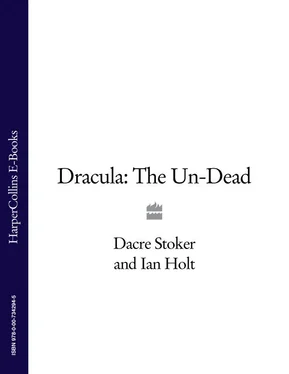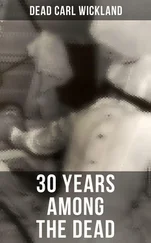Using a slipknot to secure the boat, he stumbled along the wooden dock until his land legs came back. The sight of the old Lazaret made Seward brighten. As an idealistic young physician, he had become involved with research funded by the French government, working with brilliant scientists like Charles Darwin. The study attempted to correlate the behavior of animals such as chimpanzees, rats, and mice to that of humans, hoping further to validate Darwin’s theory of evolution. During his time there, Seward had become fascinated with the one or two percent of the test subjects whose actions could be considered anomalous. Why did these anomalies exist? Could the anomalous behavior be corrected? Seward smiled, recalling walks along the sea with other scientists from the Lazaret during which they had debated and challenged the archaic views of the Church about creationism. Their studies were so controversial that the government had decided to put an end to the work, and converted the building to an oceanographic laboratory. To keep them quiet, the scientists received financial compensation. This was the money Seward used to purchase his asylum in Whitby.
Seward continued up the hill overlooking the port. As he surveyed the familiar seaside town that had hardly changed since he left, he recalled the groundbreaking work he had done on the R. N. Renfield case. Seward had diagnosed Renfield with the rare mental condition of zoophagy, or “life-eating.” The fact that Mr. Renfield had spent his entire young adult life as “normal” before showing signs of mental illness made him the perfect test case.
“Renfield,” Seward muttered aloud. He had been so hopeful when Renfield came to the Whitby Asylum. Once a promising barrister, Renfield had suddenly de-evolved into a raving, insect-devouring lunatic. If Seward could have cured Renfield, he would have proven that mental illness was a disease and was not inherited, which would have proven his theories from his days at the Lazaret and helped to strengthen Darwin’s arguments that all mammals evolved from a common ancestor. Poor Renfield, a hapless pawn taken too early in the game, had sadly become yet another addition to a long line of Seward’s failures.
Within a short distance from the port, Seward would find his old friend Henri Salmet, whom he had first met at the turn of the century when he had just lost everything: his asylum, his practice, and his family. They had most recently crossed paths four summers ago, outside Le Mans at an incredible historic event: the Wright brothers’ demonstration of their successful flying machine. The series of flights lasted only two minutes, but a new era had been born in Europe. Seward shook his head in bewilderment at the rapidly changing world around him. The French might have an antiquated railway system, but they were investing heavily in the race for the sky.
Withdrawal fatigue began to overtake his system. He could feel every bruise and cut from his tumble off the villa rooftop. He was getting old. Valiantly, he fought the urge for a fix, certain he would need his wits about him for the battle to come.
From the top of the incline, he beheld the familiar sight of Henri’s farmhouse nestled in foothills of the Alps. The once-prosperous vineyard had been plowed to create a runway. The barn now housed planes and a workshop rather than livestock. Mounted on the roof of the barn, the weather vane had been replaced by a radiotelegraphy tower.
A light flickered in Henri’s kitchen window.
“Thank God, my friend is home.”
“Jack Seward!” Henri Salmet opened the door of his modest farmhouse. “Where is the rest of you? Mon dieu , what happened to your hand?”
“ Bonsoir , Henri,” Seward said. He looked down and saw that the blood had soaked through the handkerchief. “I know the hour is late, but…”
He couldn’t help but notice that Henri had hardly changed. His handlebar moustache is a little longer. This was the last thought to cross the doctor’s mind before he succumbed to his fatigue and passed out.
Daylight forced Seward’s eyes open. He was drenched in sweat. He focused on the fresh bandage wrapped around his hand. He had to get to the theatre. Seward jerked himself out of bed and stumbled out of the room.
“Henri?” he called out. “How long have…?”
Upon entering the kitchen, he found himself in the company of Henri, his wife, Adeline, and three children who had grown much since he had last been there. The children sniggered at the sight of him; Seward was not quite presentable. He could feel the blood rushing to his face.
“ Regardez , Adeline,” Henri chuckled. “From death he has finally risen.”
“I need to get to Paris,” Seward stammered through the withdrawal symptoms that were causing his entire body to shake. He prayed Henri would think he was merely tired.
“You wish to fly to Paris?”
“I know that reaching Paris is impossible, but as close to it as your aeroplane can reach…perhaps Lyon…”
“I think you do not know what you ask. But I have always said I would do anything for a friend in need. First, you stay and rest for a few days. You frightened us last night.”
“I appreciate your hospitality, but I need to get to Paris by tonight.”
“Tonight!” cried Henri, trading an incredulous look with Adeline. “You are so worn out, you can barely stand. What could possibly be this important?”
“It’s a matter of life and death, a patient.” The lie sprang all too easily to Seward’s lips. “If she doesn’t receive a special elixir from my medical bag by…seven o’clock tonight…I fear the worst.”
Henri looked at his wife again. She nodded. “Very well,” said Henri. “A life is at stake and it’s our Christian duty to act. Sit and eat, regain your strength. We leave in an hour.”
Seward sat in relief at the table, quickly relenting to Henri’s wisdom. “I cannot thank you enough, my friend.” Adeline shushed him by placing a heaped plate of food before him.
Henri turned to his children. “Come help your papa prepare for his flight.”
One hour later, Seward carried his medical bag into the barn. He had not eaten so much in years. He hoped the food would give him the strength he needed to hold off his intensifying morphine withdrawals.
A mechanic carried metal canisters of petrol out to the field. Henri, bent over his wireless telegraph, glanced up when Seward appeared beside him. “I am wiring a friend to expect us at his field in Vichy,” he explained. “It is the halfway point, and we’ll need to refuel there.”
“May I send a message as well?” asked Seward.
“Of course.”
Seward retrieved a small card from his pocket book. “It needs to reach a person at this private wireless station at the Théâtre de l’Odéon. The post code is on the card.”
Henri tapped the wireless key. “And the message?”
TELEGRAM—Dr. Jack Seward to Basarab,
Théâtre de l’Odéon—Paris
COUNTESS BATHORY IS IN PARIS. BEWARE.
Moments later, they were walking toward Henri’s Bleriot monoplane. From a distance, Seward thought it looked like one of Da Vinci’s designs, pieced together from papier-mâché and string. He could see that the “skin” was fitted plywood. Two bicycle wheels supported the cockpit, and the propeller had only two blades. “There she is,” Henri said, beaming. “Fifty horsepower, and capable of a height of two thousand feet.”
Seward choked on his response as Henri’s son took his medical bag and strapped it into a storage compartment at the back of the cockpit, then helped him into the rear passenger seat. Seward was giddy with delight as he watched Henri kiss his wife and two young daughters and march boldly toward the plane. He could hardly believe that he would be in the air in only a few moments.
Читать дальше












